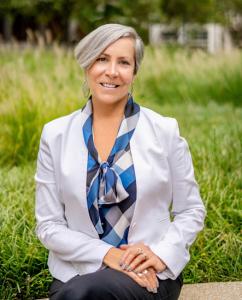Laurel Bryant

NOAA Heritage Oral History Project
NOAA Heritage Oral History Project aims to document the history and legacy of NOAA through compelling interviews with its leaders. These firsthand accounts provide an invaluable resource that preserves NOAA's significant contributions to environmental research and management, fostering a deeper understanding of NOAA's vital role in shaping our understanding of the Earth's oceans and atmosphere.
Molly Graham
Laurel Bryant was born in Mount Vernon, Washington, and raised in Seattle. She attended Shoreline Community College for two years and then graduated from the University of Washington with a degree in Political Science and Economics with a concentration in Environmental Sciences. She came to Washington, DC, in 1989 and worked for the United States House of Representatives Merchant Marine and Fisheries Committee, the predecessor to the House Natural Resources Committee. Laurel came to work for NOAA in 1994, working as the Executive Director to the Marine Fisheries Advisory Committee and spearheaded many projects and initiatives with NOAA Fisheries. She retired in 2019 as the chief of external affairs in NOAA Fisheries’ Communications Office.
Please Note: The oral histories in this collection are protected by copyright and have been created for educational, research and personal use as described by the Fair Use Doctrine in the U.S. Copyright law. Please reach out Voices@noaa.gov to let us know how these interviews are being used in your research, project, exhibit, etc. The Voices staff can help provide other useful resources related to your inquiry.
The NOAA mission is to understand and predict changes in climate, weather, oceans, and coasts, to share that knowledge and information with others, and to conserve and manage coastal and marine ecosystems and resources. The Voices Oral History Archives offers public access to a wide range of accounts, including historical materials that are products of their particular times, and may contain offensive language or negative stereotypes.
Voices Oral History Archives does not verify the accuracy of materials submitted to us. The opinions expressed in the interviews are those of the interviewee only. The interviews here have been made available to the public only after the interviewer has confirmed that they have obtained consent.
